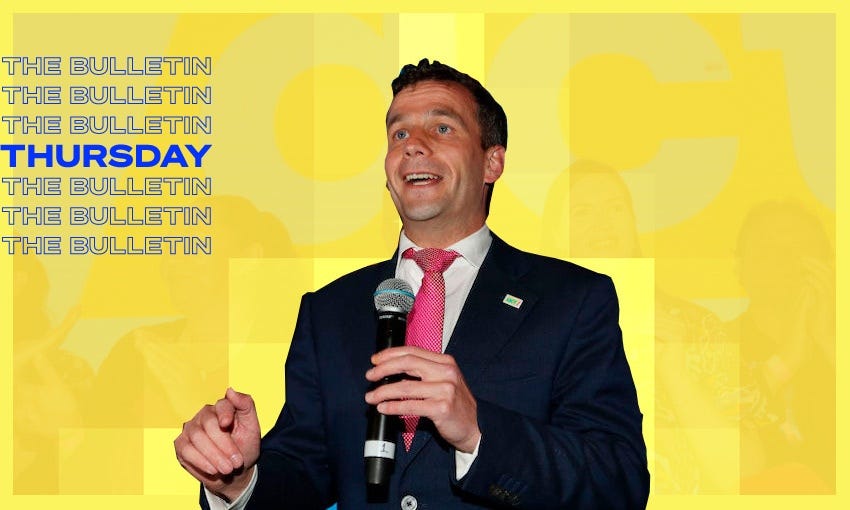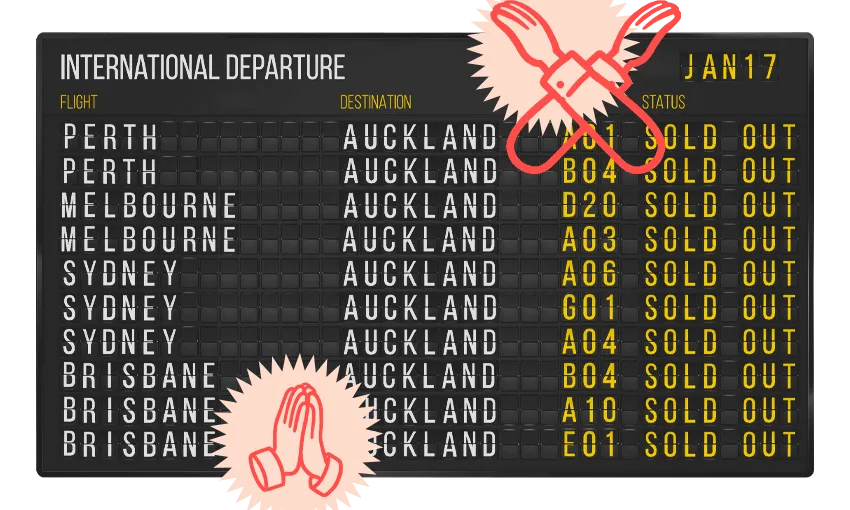The other leader of the opposition
David Seymour talks about Act’s rising poll numbers, being a 'constructive opposition' and his deep dislike for Morning Report
Mōrena and welcome to The Bulletin for Thursday, December 9, by Justin Giovannetti. Presented in partnership with Z Energy.
In today’s edition: New defence study warns of threats; Waitangi Tribunal hears Māori Covid grievances; Olympic boycott spreads; but first, David Seymour.
Act leader David Seymour. (Greg Bowker/Getty Images; additional design Tina Tiller)
Sitting in Act’s offices at parliament, David Seymour has a smile on his face. Why wouldn’t he? He’s at the head of a party with 10 seats and, despite a large intake of rookies last year, he’s avoided scandal. Instead, the party’s popularity has soared in a number of polls, taking support in equal measure from both Labour and National. Jacinda Ardern, in a breach of protocol, called him “the other leader of the opposition” in parliament last month.
“It’s been a long year. It’s hard work getting votes,” says Seymour, reflecting on the year. “The fact that people are coming to Act from across the spectrum tells me our approach to politics has much wider appeal than many imagine.”
There’s a lot to celebrate for Act. End-of-life care, one of the party’s priorities, is now the law. The party's motion criticising China’s human rights abuses got through parliament, albeit watered down by Labour. Seymour has also found himself allied with the Greens occasionally, with both parties now calling on the government to rewrite its housing intensification bill. You can dislike Act’s politics, but they’ve clearly been an effective opposition party.
“I think we’ve played a positive role in putting forward new ideas,” says Seymour. “Look at our alternative budget, our papers on crime, housing and the economy. We’ve done three different papers on Covid since August and a lot of it has turned out to be what happens.”
A serious misstep worth mentioning was Seymour’s decision earlier this year to tweet out a priority code for Māori to access the Covid-19 vaccine. In an echo of that, he also accused Northland iwi earlier this week of being “thugs” for planning highway checkpoints this summer.
The party’s Covid-19 proposals, once ignored, are now mainstream. Act keeps a running tally of Covid-19 ideas they’ve proposed that get picked up by the government. Compared to conservative parties overseas that still deny Covid, Act’s role has been a positive one. As someone who covers Covid-19 on a daily basis, I’ve gone through their list of ideas and it’s hard to think of many that might not become policy one day, now that the government has dropped elimination and is set on reopening.
Yesterday, Sir Brian Roche told parliament’s health select committee that the government should consider creating an epidemic response unit that brings together the public sector and private enterprise. The idea was almost identical to a proposal put forward by Seymour.
Some parts of the government’s Covid approach still frustrate him. He’d like Ashley Bloomfield’s advice to cabinet to be released nearly immediately after the government acts on it, instead of weeks or months of delay. A perfect example of that was a story from the NZ Herald yesterday revealing that Bloomfield had recommended dropping the Auckland border weeks before the government’s plan. That segues into complaint number two: the government’s caution.
“It’s politics,” he says, not science. “If you change your position, you risk losing the support of people who agree with your position and if you change back you lose everybody. Their brand is being ultraconservative on Covid risk and everything else can be paid for with borrowed money.”
The ban on Morning Report. Seymour won’t appear on RNZ’s morning radio show. Neither side has really made a big deal about it, but he just stopped. The thing about David Seymour is that in conversation he’s quiet, he’s polite and he’s thoughtful. But when asked about Morning Report, a fuse is lit.
“After the umpteenth time that I went on their show out of a feeling of public duty and was belittled and abused with all their snarkiness, I just thought, I don’t need this,” he says. Seymour runs through his complaints. He says they are rude, selective and dishonest about what they want to talk about.
“I really want to differentiate that really toxic and comically lilliputian culture of Morning Report from the rest of RNZ. I think Jane [Patterson, RNZ’s political editor] runs one of the best teams in the gallery, we love going on with Lisa on Checkpoint and we’ll go on various other shows”.
His next reality franchise. Few New Zealanders are unaware of Seymour's twerking on Dancing with the Stars. It certainly didn’t hurt his political career, and he might not be done with reality television just yet. “I’d be keen to get into some cooking. I did baking and that didn’t go so well. I’m really keen to get into Indian cooking, so watch this space.”
This is the second in a series of end-of-the-year interviews.
New defence assessment warns of ‘negative trajectory’ for Pacific security. Stuff reports that for the first time in seven years, a new defence assessment was released that warns a powerful China, growing militarisation in the Pacific and climate change are putting New Zealand’s security at risk. In response, the defence minister announced plans to focus on the military’s culture, diversity and the quality of camp housing. Experts aren’t sure the government is ready to match the emerging challenge. The defence force also warned that it’ll need years to recover from the strain of staffing border facilities after that assignment eventually ends.
The Covid numbers: There are 74 cases in hospital and 6 in ICU/HDU. There are now 9,354 cases in the delta outbreak. 71 new community cases were reported in Auckland yesterday, 9 in Waikato, 5 in Bay of Plenty, 3 in Northland, 1 in Rotorua and 1 in Nelson. 24,142 people were vaccinated on Tuesday.
The Spinoff’s Covid data tracker has the latest figures.
Māori Covid grievances get hearing at Waitangi Tribunal. Much of what’s been said at the tribunal isn’t new, although there have been a few bombshells. However, when the first three days of testimony is put together, it’s hard not to see a deep failure of Māori at every stage of the pandemic, according to One News. In an affidavit to the tribunal, Covid-19 minister Chris Hipkins explained that economic, social and business pressures outweighed concerns about Māori health, Stuff reports. The tribunal is looking into whether the Treaty of Waitangi was breached by the government’s failure to care for one of the country’s most vulnerable groups.
Multiple investigations into doctor filmed by Newshub issuing medical certificate exemptions. Patrick Gower, aided by a hidden camera, revealed on Newshub last night that Dr. Jonie Girouard has been providing anti-vaxxers with medical exemptions to the Covid-19 vaccine from her weight loss clinic in Kaiapoi. Only the ministry of health can provide exemptions. It’s an incredible story and a number of government agencies are now following up on it.
A note on Japan’s familiar beauty from our partner Japan National Tourism Organization: As we begin to open up our country again, and the dreams of international travel become one step closer to reality, Japan waits for us once more.
From Mt Fuji to Shikoku surfing, Japan's natural beauty is reminiscent of our own slice of paradise. With its rich culture and famous foods, it deserves a spot at the top of your future travel list. Whether you're a relaxer or an adventurer, there's something for you in Japan.
If we haven't convinced you yet, this piece, (with striking illustrations by Ross Murray) should do the trick.
Auckland’s great crime spree might not be. There have been warnings and headlines in recent weeks that Auckland is descending into Aotearoa’s version of 1970s New York—a reference that can best be understood as decrepit and full of crime. But the doom might not be backed by fact. Newsroom reports that crime is lower today than it was five years ago in Auckland. It’s even lower than just last year. Instead of a crime spree, it might just be an old fashioned moral panic, largely caused by bored people spending all day at home and noticing things that otherwise wouldn’t have received much attention.
Australia, UK, Canada joins diplomatic boycott of the Beijing winter Olympics. The United States went first, but now the trio of English-speaking countries is also vowing not to send any government officials to the games, citing what has been called China’s genocide against its Muslim minority. China has vowed that it will make the US and others “pay the price”, according to Reuters. There are reports that Japan is also considering joining. New Zealand’s situation is more complicated. It’s not joining the boycott, but it’s also not sending any officials, citing Covid-related travel constraints.
Got some feedback about The Bulletin, or anything in the news?
Get in touch with me at thebulletin@thespinoff.co.nz
Right now on The Spinoff: Reweti Kohere reports that while Australia-based New Zealanders can return home from January 17, getting a flight is a big problem. Naomii Seah looks at the history of vaccine passes. Shanti Mathias digs through the archives and discovers what we predicted about the internet 20 years ago. Chris Schulz, as part of Lord of the Rings week, writes about what his 11-year-old thought of the series while watching it for the first time. Tara Ward has all our Google trends for 2021, from scones to Squid Games.
England stumbles in first day of Ashes. Very little went well for England yesterday as it faced Australia. In a bit of classic British understatement, RNZ reports that an English batsman conceded that it was a “disappointing start” for their side. But there’s a lot of play left, until mid-January, if I’m reading the schedule for this sporting series correctly.
That's it for The Bulletin. If you want to support the work we do at The Spinoff, please check out our membership programme.









